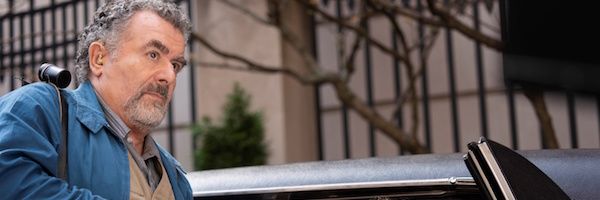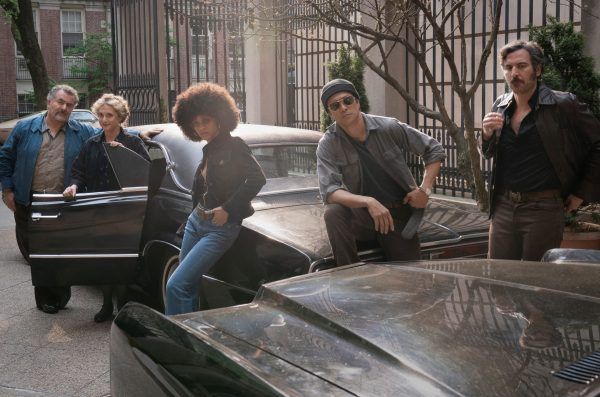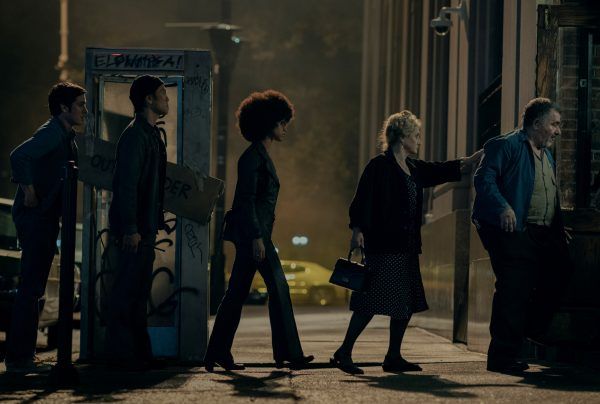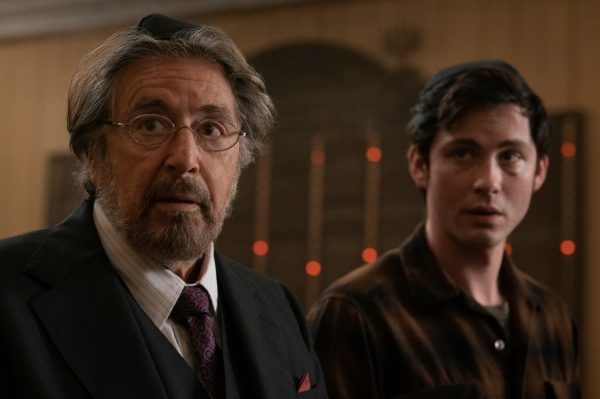From co-showrunners David Weil (who also created the series) and Nikki Toscano, the Amazon Prime Video original series Hunters follows a diverse band of Nazi hunters, lead by Meyer Offerman (Al Pacino), living in 1977 New York City, who have discovered that hundreds of high-ranking Nazi officials are living among the population as they work to create a Fourth Reich. Leaving a trail of blood behind as they bring the Nazis to justice and attempt to stop their genocidal plans, Jonah Heidelbaum (Logan Lerman) finds himself in the middle of this secret world of vengeance and he must decide just how far he’s willing to go.
During this 1-on-1 phone interview with Collider, actor Saul Rubinek (who plays hunters team member Murray Markowitz, one half of a deadly husband and wife duo) talked about his own family’s connection to the Holocaust and why that made him nervous about signing on for this show, his reaction to the Hunters script, the stand-out dynamic he has with co-star Carol Kane as Mindy Markowitz, having his real-life daughter play his daughter on the series and why that was both difficult and wonderful, and what he’s going to be doing next.
Collider: When this came your way, what was your reaction?
SAUL RUBINEK: Well, before I read the script, I was a little nervous about it because of my own background and because my parents are survivors. They were hidden for two and a half years. They weren’t in a concentration camp, but still, that’s my background. I had taken my parents back to Poland to make a documentary film, which was a reunion between them and the farmers who hid them. I had written a book about that and their experiences. So, I was a little bit worried about a show that seemed to be about Jews taking their revenge out on Nazis that they’d found, and thought that it might be trivializing everything. But then, when I read it, I realized that it was a much deeper show than that. It’s dealing with the consequences of violence, when violence is used as a way of getting retribution, and what effect that has on people who are taking revenge. That’s part of the theme of the show. So, I was worried, but then when I read it, I wasn’t worried as much, and I was deeply gratified to find out how deep we were actually going into this kind of storytelling.
It seems that even after reading the first episode, you might still have some questions because this is the first show that the creator has done and he’s swinging really big for the story that he’s telling. Did you also want to talk to David Weil about what this would evolve into, so that you were aware of the bigger picture?
RUBINEK: I got a glimpse of that because I had to audition with material that was not from the first episode, and also because I knew that Jordan Peele was involved, as a producer and as part of the development of this, so I knew I was probably going to be on safe ground. And then, once I was cast and spoke to David and Nikki [Toscano] about which direction they were going and how they were going, it was pretty clear, what it was gonna be and that it was gonna be a great experience.
Did you know, from the beginning, that you would have this dynamic with Carol Kane, or was that something that that evolved, during the development process?
RUBINEK: I didn’t know it was gonna be Carol Kane, but I ended up being very lucky that it was Carol Kane because she’s a wonderful actor. We developed a wonderful shorthand between us, so that we can create the illusion that we’d been together for decades. That, I hope, comes across in the series. And as the stories developed, we didn’t always wanna know everything. We wanted some of the stuff to happen to us. But we were told enough to have an idea of where these characters were going and where their storylines were going, so that we could lay the track that was necessary. The most important part of all of that work, as an actor, is whether you’ve got the people around you to collaborate with. Some environments are more collaborative than others, and this was a particularly fortunate experience because we had the showrunners on set with us, at all times, and a very generous and extraordinarily talented group of regular cast and great directors. It was really a spontaneous experience. We were able to change things, some small and some larger, on the spot ‘cause the showrunners were there. It’s a pleasure to be able to say that was the experience, doing the show.
The relationship between your characters is one of my favorite parts of the show, and watching the two of you together is delightful. On a show like this, that can get extremely violent, there’s just something about those two characters that keeps you wanting to watch them.
RUBINEK: Yes. And my daughter, Hannah [Reid Rubinek], was cast as the daughter of [Mindy and Murray], and she comes into it in Episode 6. Things take a very interesting and unexpected turn, starting in the last half of the show, which really profoundly affects Murray and Mindy.
What was it like to have your own daughter involved with the show, especially with your family background?
RUBINEK: Well, it was difficult and wonderful, at the same time, partly because that documentary film that I mentioned and the book that I wrote, before I met Eleanor, Hannah’s mom, and we’ve been together now for over 30 years, we waited until Hannah was 13 to introduce her to the subject of her grandparents and my parents’ background. We didn’t want to give her this information before she was emotionally or intellectually ready to deal with it, and when we did introduce her to the subject, through the documentary, she allowed us to use the documentary to introduce her class at school to the subject, not so much for Holocaust education, but as a way of inspiring the 13- and 14-year-old kids, to investigate their own family because in their own family backgrounds, they are great stories of love, miracles, murder and betrayal. All of the great stuff of great novels is in their backgrounds, and they’re not really aware of it, until they ask the right questions of the right people. The problem was that one of Hannah’s best friends in the classroom was also, by coincidence, the great-granddaughter of somebody high up in the SS. And so, her friend’s mother was brave enough to open the doors and windows on her own background, which is harder to do when your background is with perpetrators than it is with victims.
But the truth is that none of us have backgrounds that are just one thing. There are perpetrators and victims of all kinds, in all of our backgrounds, as human beings. And so, part of that story of what Hannah had to go through, when she was 13 years old, with her friend, and what was going on in the episodes that had to do with Hannah and the background of what happened to Mindy and Murray when the Holocaust was happening, came to roost. It was emotionally a very draining experience, but made easier by the fact that there was somebody whose eyes I could look into. On the one hand, there was my fellow actor, Carol Kane, who I had already been working with for months, and who was my colleague and became my ally, and there was my own daughter. So, that was a profound experience for me, as an actor, and one I’d never really had before.
You’ve been in this business for a long time, so you’ve seen how much the landscape has changed. You’re now doing a TV series with Al Pacino on a streaming network. Does the way you work now feel very different?
RUBINEK: Not really. When you’re doing a show, whether it was in 1982 or 2018, as an actor, you’re really just concerned with individual scenes, in the moment, and whether or not you’re gonna be able to tell it, and whether it’s collaborative or not. What is different is the scope of it. There are 200 countries seeing the series. That’s different. There was this freedom from any kind of censorship that would have come by way of sponsors on network television. That there are actors, like Al Pacino, that are willing to do television speaks hugely to the kind of material that is now a possible on television, and that was impossible, 20 years ago or maybe even 10 years ago. But as far as the actual doing of it, when you’re in the moment, actors are just trying to tell the truth, in the best way they can, under circumstances that are sometimes difficult ‘cause they’re not collaborative, and sometimes, like this one, are very collaborative and really freeing, partly because there was just this openness that came by way of Jordan Peele’s company, Amazon, and these particular showrunners, who were so wonderful to work with, and generous and embracing. And there was a great group of actors. That was a real blessing. You can tell, from watching it, the bond that we all had. It’s really hard to fake that, hour after hour after hour, and we didn’t need to fake. We found it with each other, which was great. But that could have happened in the 17th century, on stage. That’s not different. What’s different is the reach of a show like this, and how it might affect people, in ways that we have no idea about. It’s going to countries in all kinds of places. It’s going to places that are dealing with war, in a way that we’re not dealing with, the same way here. So, I think that the affect of a show like this will be profound. I hope it is.
Are you someone who’s also moved into this world of streaming? Do you watch TV that way, yourself?
RUBINEK: There are shows that I stream. I have a 24-year-old son and a 28-year-old daughter, and they grew up with it, so I grew up with it. There are shows that I binge-watch, but there’s only so much of it that you can do. With this show, even though they dropped 10 episodes, it’s a little too intense to watch, all at once. I started working on a computer in 1984, when the first Apple computers came out, so I’ve managed to keep up.
At this point in your life and career, what is it that you look for in projects and roles? What gets you excited about the work?
RUBINEK: I’m going back to the theater, a bit. I’m about to go do a new play by Ethan Coen. I worked with the Coen brothers on The Ballad of Buster Scruggs, a couple of years ago, and I got to know them, so I’m going to New York to do a new play of his, called A Play is a Poem. I’m a playwright. I wrote a play, a few years ago, called Terrible Advice, and I’ve got a new play, called All in the Telling, which has to do with some of the subjects that I was talking to you about, with how my book got written, how the documentary film happened, what happened to my daughter and her classmate, and all of that true story. So, that that’s really keeping me going. As far as new projects are concerned, I take them as they come. I’ve never really had a fixed goal for what kind of roles I want to play. I take them as they come, depending on whether I’m forced to do it because I have to pay the rent, or if I’m not as worried about the rent this particular month, then it’s about whether or not the role really speaks to me loudly. Sometimes it’s doesn’t have to speak to me loudly because the bank is already speaking to me loudly.
Hunters is available to stream at Amazon Prime.




